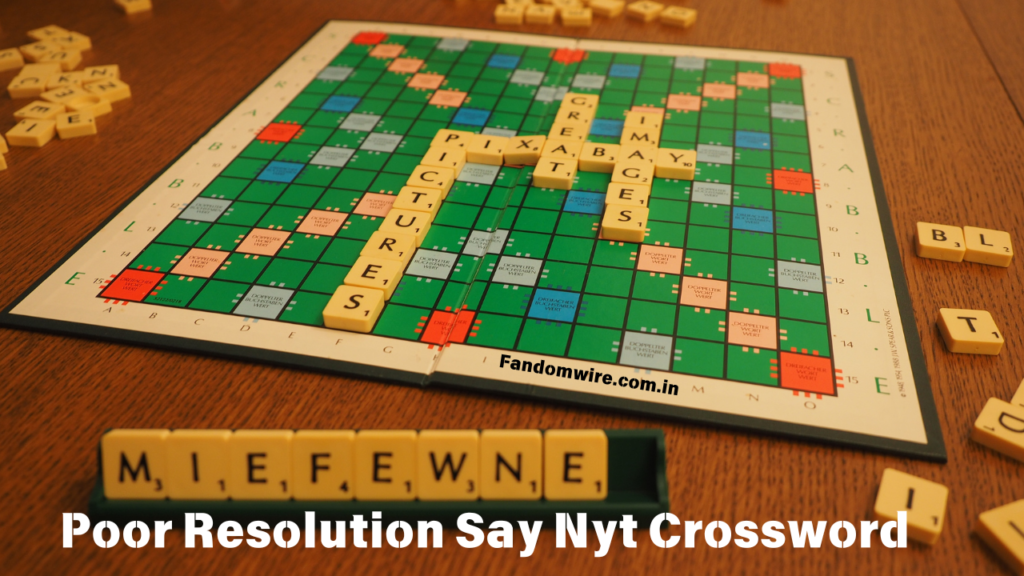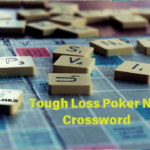The “poor resolution say nyt crossword” has gained attention among avid puzzle solvers and crossword enthusiasts. Whether you’re new to crossword solving or a veteran at decoding wordplay, this intriguing phrase has sparked curiosity and discussions. From its meaning to its significance in the puzzle-solving world, understanding it can open the door to better crossword strategies and enjoyable moments with your favorite hobby.
What is “Poor resolution say nyt crossword”?
The “poor resolution say nyt crossword” refers to a clue often seen in The New York Times Crossword, where solvers must interpret the phrase to find a suitable answer. In crossword terminology, “say” usually signals a synonym, wordplay, or an indirect hint to guide you to the correct answer. “Poor resolution” could represent a literal or metaphorical issue, such as unclear decisions or blurry images.
In many cases, clues like this are designed to challenge your critical thinking skills. They tap into double meanings, puns, and nuanced interpretations, making crossword-solving both a mental workout and a source of entertainment.
Why Is “Poor resolution say nyt crossword” Important?
This clue is more than just a frustrating riddle. It’s an example of how crosswords use language intricately, blending logic, wordplay, and trivia. Here’s why understanding it matters:
- Encourages Critical Thinking: Solving these types of clues forces your brain to connect ideas creatively.
- Expands Vocabulary: You’re exposed to uncommon words, synonyms, and idioms, improving your language skills.
- Enhances Pattern Recognition: Recognizing how clues like “poor resolution” work helps with future puzzles.
- Boosts Problem-Solving Skills: Crossword-solving techniques can sharpen your mental agility in everyday decision-making.
Crossword enthusiasts love clues like these because they embody the challenge and satisfaction that puzzles offer.
Why Is “Poor resolution say nyt crossword” Trending?
The popularity of the phrase stems from its unique position in The New York Times Crossword, often considered the gold standard of puzzles. Several factors contribute to its trending status:
- Increased Interest in Crosswords: With apps and online platforms making puzzles more accessible, crossword-solving is enjoying a renaissance.
- Social Media Buzz: Fans often share particularly tricky clues like “poor resolution” on Twitter or Reddit, sparking debates and discussions.
- Puzzle Challenges: The clue taps into the enduring appeal of cryptic or ambiguous wordplay, which solvers love to crack.
- Global Puzzle Community: Crossword enthusiasts around the world exchange ideas and tips, spreading awareness of such intriguing clues.
Benefits of Solving “Poor resolution say nyt crossword”
Working through clues like this has numerous cognitive and emotional benefits:
- Mental Exercise: Crosswords stimulate your brain, keeping your memory sharp and your mind active.
- Stress Relief: Focusing on solving puzzles can be meditative, helping to relieve stress and anxiety.
- Sense of Accomplishment: Finding the correct answer to a tricky clue like “poor resolution” is incredibly satisfying.
- Improved Focus: Puzzles demand concentration, helping you practice mindfulness.
- Community Connection: Sharing tips and solutions fosters a sense of camaraderie among solvers.
The act of decoding clues like this one is not just fun but also provides a significant boost to your overall mental health.
Useful Hints for Solving “Poor resolution say nyt crossword”
If this particular clue has you stumped, here are some effective strategies to crack it:
- Analyze “Say”: Remember, “say” in crossword clues often indicates that you’re looking for a synonym or a phonetically similar word.
- Consider Context: Think about what “poor resolution” could metaphorically represent, such as indecision or blurriness.
- Break It Down: Focus on one part of the clue at a time. For example, start by interpreting “poor resolution” before tackling “say.”
- Fill in Surrounding Answers: Use intersecting clues to provide letters that might help you guess the word.
- Think Outside the Box: The answer may involve wordplay, puns, or even cultural references.
For example, if “poor resolution” alludes to an unclear photo, the answer could be “blur.” But if it refers to indecision, “vague” or “iffy” might fit.
Why Use “Poor resolution say nyt crossword”?
Engaging with clues like this one in the New York Times Crossword has numerous advantages:
- Challenge Your Skills: It pushes you to think critically and expand your knowledge.
- Learn New Words: These clues often introduce solvers to obscure or rarely used terms.
- Develop Persistence: Some clues might take hours to solve, teaching patience and perseverance.
- Boost Puzzle-Solving Strategies: You learn how to spot patterns, identify wordplay, and think laterally.
In short, solving such clues is not just about entertainment—it’s an intellectual and educational pursuit.
Interesting Facts About “Poor resolution say nyt crossword”
- The New York Times Crossword often uses similar phrasing to test solvers’ interpretive abilities.
- Clues like “poor resolution” may require knowledge of idioms, slang, or technical terms.
- These puzzles are carefully crafted by experienced crossword constructors who balance difficulty with solvability.
- The phrase might appear in various contexts, making it versatile and intriguing.
How to Approach Difficult Crossword Clues
If “poor resolution say nyt crossword” feels particularly challenging, follow these practical tips:
- Stay Calm: Take a break and return to the puzzle with fresh eyes.
- Consult a Dictionary: Look up meanings or synonyms for the words in the clue.
- Seek Online Help: Crossword forums and solver tools can provide hints without spoiling the fun.
- Learn Common Patterns: Familiarize yourself with common crossword tropes, such as homophones or abbreviations.
- Practice Regularly: The more puzzles you solve, the easier it becomes to decode tricky clues.
The Role of Creativity in Crossword Solving
Creative thinking is essential when tackling clues like “poor resolution.” These puzzles demand lateral thinking—seeing connections that aren’t immediately obvious. Consider how words might have multiple meanings or how they can be rearranged to form puns.
For instance, “poor resolution” might be interpreted as “lack of clarity,” leading to answers like “murky,” “fuzzy,” or “dim.” On the other hand, thinking metaphorically could yield words like “indecision” or “half-hearted.”
The Joy of Solving the NYT Crossword
The New York Times Crossword is a beloved institution, offering daily challenges for solvers of all skill levels. Clues like “poor resolution say nyt crossword” are a reminder of how puzzles combine intellectual rigor with pure fun. They’re not just about finding the right word—they’re about the journey of getting there.
Conclusion
The “poor resolution say nyt crossword” clue exemplifies the beauty and complexity of The New York Times Crossword. By engaging with such challenges, you not only sharpen your mind but also discover the joy of creative problem-solving. Whether you’re decoding this clue or tackling the next big puzzle, remember that persistence and curiosity are your greatest allies.
Also Read: Lync conf mods: Everything You Need to Know
FAQs
What does “say” mean in crossword clues?
- In crossword puzzles, “say” often indicates a synonym, an example, or a word that sounds similar.
How do I solve “poor resolution say nyt crossword”?
- Break the clue into parts, think about its literal and metaphorical meanings, and use intersecting answers for hints.
Why are NYT crossword clues so tricky?
- The New York Times Crossword is designed to challenge solvers with clever wordplay, double meanings, and cultural references.
Can I improve my crossword-solving skills?
- Absolutely! Regular practice, learning common clue patterns, and expanding your vocabulary will help you become a better solver.
What makes the NYT Crossword unique?
- Its high-quality construction, clever clues, and diverse themes set it apart from other puzzles.
What are common answers for “poor resolution”?
- Possible answers include “blur,” “vague,” “iffy,” “dim,” or “unclear,” depending on the context.


